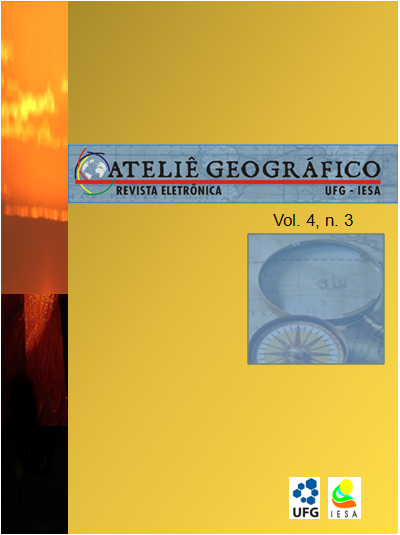DEMOCRACY AND TERRITORIAL PLANNING: Goiânia Urban Development and Collaborative Master Plans in the MRG
DOI:
https://doi.org/10.5216/ag.v4i3.16646Abstract
The deterioration of the quality of life in the great Brazilian cities has taken to the reflection a reasonable number of researchers of social sciences in Brazil in this beginning of century. Although they already had been debated previously, it is in the period of the democratization of years 1980 that the urban problematic in Brazil acquires a content properly politician. Through the National Movement for Urban Reform (MNRU) (MNRU) the claims gain prominence relative to the levels of social injustice in the urban way, as well as the pressures for the democratization for planning and management. In this perspective, the processes of definition of the urban politics are, now, demarcated for a new relation between State and society. In the same time, the performance of the agents in the spaces of decision and control is guided by new forms and contents. This study aimed to identify the contents of popular participation and democratization in Participative Director Plans from four cities of Goiânia’s Metropolitan Region, elaborated between the years of 2004 and 2008.
Downloads
Downloads
Published
How to Cite
Issue
Section
License
Autores que publicam nesta revista concordam com os seguintes termos:- Autores mantém os direitos autorais e concedem à revista o direito de primeira publicação, com o trabalho simultaneamente licenciado sob a Licença Creative Commons Attribution que permite o compartilhamento do trabalho com reconhecimento da autoria e publicação inicial nesta revista.
- Os autores não serão remunerados pela publicação de trabalhos na Revista Ateliê Geográfico. Além disso, os conteúdos publicados são de inteira e exclusiva responsabilidade de seus autores, ainda que reservado aos editores o direito de proceder a ajustes textuais e de adequação às normas da publicação.
- Autores têm permissão e são estimulados a divulgar seu trabalho online (ex.: em repositórios institucionais ou na sua página pessoal), já que isso pode gerar alterações produtivas, bem como aumentar o impacto e a citação do trabalho publicado (Veja O Efeito do Acesso Livre).


